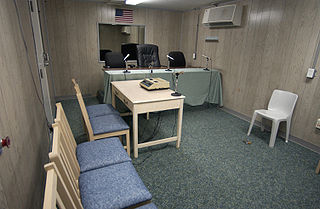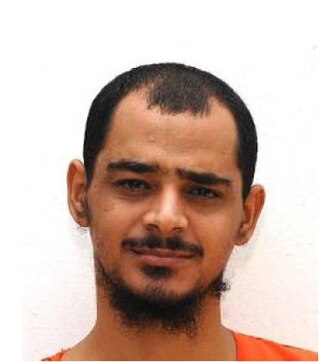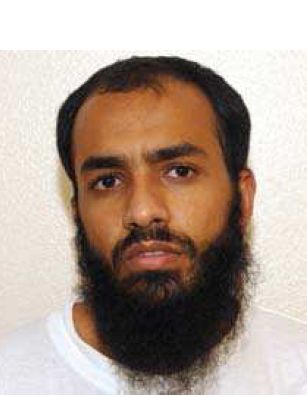
Ibrahim Ahmed Mahmoud al Qosi is a Sudanese militant and paymaster for al-Qaeda. Qosi was held from January 2002 in extrajudicial detention in the United States Guantanamo Bay detainment camps, in Cuba. His Guantanamo Internment Serial Number is 54.

The Combatant Status Review Tribunals (CSRT) were a set of tribunals for confirming whether detainees held by the United States at the Guantanamo Bay detention camp had been correctly designated as "enemy combatants". The CSRTs were established July 7, 2004 by order of U.S. Deputy Secretary of Defense Paul Wolfowitz after U.S. Supreme Court rulings in Hamdi v. Rumsfeld and Rasul v. Bush and were coordinated through the Office for the Administrative Review of the Detention of Enemy Combatants.

Mustafa Ait Idir is an individual formerly held in the United States Guantanamo Bay detainment camps, in Cuba. Ait Idir was born in Algeria, but moved to Bosnia, married a Bosnian woman, and became a Bosnian citizen. Idir was arrested on October 18, 2001, on suspicion of participating in a conspiracy to bomb the United States Embassy. After their release following their acquittal, the six men were captured on January 17, 2002, by American forces, who transferred them to Guantanamo Bay.

Adnan Farhan Abdul Latif, also known as Allal Ab Aljallil Abd al Rahman, was a Yemeni citizen imprisoned at the U.S. military prison at Guantanamo Bay, Cuba, from January 2002 until his death in custody there, ruled a suicide.

Yasin Qasem Muhammad Ismail is a Yemeni held in extrajudicial detention in the United States Guantanamo Bay detainment camps, in Cuba. His Guantanamo Internment Serial Number is 522. Joint Task Force Guantanamo counter-terrorism analysts estimate he was born in 1979, in Ibb, Yemen.
Starting in 2002, the American government detained 22 Uyghurs in the Guantanamo Bay detainment camp. The last 3 Uyghur detainees, Yusef Abbas, Hajiakbar Abdulghupur and Saidullah Khali, were released from Guantanamo on December 29, 2013, and later transferred to Slovakia.

Yasim Muhammed Basardah is a citizen of Yemen who was detained in the United States's Guantanamo Bay detention camps, in Cuba. His Guantanamo Internment Serial Number is 252. Basardah was an informant for the interrogators in Guantanamo where he was rewarded with his own cell, McDonald's apple pies, chewing tobacco, a truck magazine and other "comfort items".
Peter Sabin Willett, known as Sabin Willett, is an American lawyer and novelist, a partner with the Philadelphia-based law firm Morgan, Lewis & Bockius, formerly a partner at Bingham McCutchen. He lives near Boston, Massachusetts. He is perhaps best known as a defense lawyer for several Uighur prisoners at the Guantanamo Bay detainment camp.
Majid Shoukat Khan is a Pakistani who was the only known legal resident of the United States held in the Guantanamo Bay Detainment Camp. He was a "high value detainee" and was tortured by U.S. intelligence forces.

Ibrahim Othman Ibrahim Idris was a citizen of Sudan, formerly held in extrajudicial detention in the United States' Guantanamo Bay detainment camps, in Cuba. His detainee ID number was 036.
Adil Hadi al Jazairi Bin Hamlili is a citizen of Algeria who was held in extrajudicial detention in the United States Guantanamo Bay detainment camps, in Cuba. The US Department of Defense reports that Bin Hamlili was born on 26 June 1976, in Oram (Oran) [sic] Algeria. His Guantanamo Internment Serial Number was 1452.
Abdel Hamid Ibn Abdussalem Ibn Mifta Al Ghizzawi is a citizen of Libya who was held from June 2002 until March 2010 in the Guantanamo Bay detainment camps, in Cuba because the United States classified him as an enemy combatant. His internment number was 654.
Boumediene v. Bush, 553 U.S. 723 (2008), was a writ of habeas corpus petition made in a civilian court of the United States on behalf of Lakhdar Boumediene, a naturalized citizen of Bosnia and Herzegovina, held in military detention by the United States at the Guantanamo Bay detention camps in Cuba. The case underscored the essential role of habeas corpus as a safeguard against government overreach, ensuring that individuals cannot be detained indefinitely without the opportunity to challenge the legality of their detention. Guantánamo Bay is not formally part of the United States, and under the terms of the 1903 lease between the United States and Cuba, Cuba retained ultimate sovereignty over the territory, while the United States exercises complete jurisdiction and control. The case was consolidated with habeas petition Al Odah v. United States. It challenged the legality of Boumediene's detention at the United States Naval Station military base in Guantanamo Bay, Cuba as well as the constitutionality of the Military Commissions Act of 2006. Oral arguments on the combined cases were heard by the Supreme Court on December 5, 2007.
Stephen Abraham is an American lawyer and officer in the United States Army Reserve. In June 2007, he became the first officer who had served on a Combatant Status Review Tribunal to publicly criticize its operations. He said the evidence provided did not meet legal standard, and the members of the panels were strongly pressured by superiors to find that detainees should be classified as enemy combatants. Abraham served in the Office for the Administrative Review of the Detention of Enemy Combatants.
Al Odah v. United States is a court case filed by the Center for Constitutional Rights and co-counsels challenging the legality of the continued detention as enemy combatants of Guantanamo detainees. It was consolidated with Boumediene v. Bush (2008), which is the lead name of the decision.
In United States law, habeas corpus is a recourse challenging the reasons or conditions of a person's detention under color of law. The Guantanamo Bay detention camp is a United States military prison located within Guantanamo Bay Naval Base. A persistent standard of indefinite detention without trial and incidents of torture led the operations of the Guantanamo Bay detention camp to be challenged internationally as an affront to international human rights, and challenged domestically as a violation of the Due Process Clause of the Fifth and Fourteenth amendments of the United States Constitution, including the right of petition for habeas corpus. On 19 February 2002, Guantanamo detainees petitioned in federal court for a writ of habeas corpus to review the legality of their detention.
Bismullah v. Gates is a writ of habeas corpus appeal in the United States Justice System, on behalf of Bismullah —an Afghan detainee held by the United States in the Guantanamo Bay detention camps, in Cuba. It was one of over 200 habeas corpus petitions filed on behalf of detainees held in the Guantanamo Bay detention camp in Cuba.
Guantanamo Bay detainees have been allowed to initiate appeals in Washington, D.C., courts since the passage of the Detainee Treatment Act of 2005 (DTA) closed off the right of Guantanamo captives to submit new petitions of habeas corpus. It substituted a right to a limited appeal to Federal Courts of appeal in Washington, D.C. The Act allowed detainees to challenge whether their Combatant Status Review Tribunals had correctly followed the rules laid out by the Department of Defense.

Abdul Latif Nasir is a Moroccan man formerly held in administrative detention in the United States Guantanamo Bay detention camps, in Cuba. His Guantanamo Internment Serial Number was 244. Joint Task Force Guantanamo counter-terrorism analysts report he was born on March 4, 1965, in Casablanca, Morocco. Abdul Latif Nasir and Sufyian Barhoumi tried to file emergency requests to be transferred from Guantanamo in the final days of Barack Obama's presidency.

Muhammaed Yasir Ahmed Taher was a citizen of Yemen, who was held in extrajudicial detention in the United States's Guantanamo Bay detention camps, in Cuba. His Guantanamo Internment Serial Number was 679. American intelligence analysts estimate he was born in 1980, in Ibb, Yemen.









